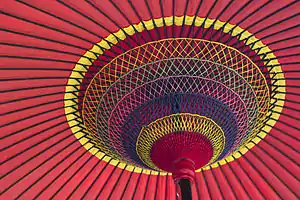Kittisol
Kittisol is an obsolete Indian-English term from the 19th Century for paper umbrellas, and rain-cloaks, made of oiled paper, afterwards varnished. They were made in China or Japan,[1] and the name may have originated in the Portuguese quita-sol, meaning "excluding the sun", for parasol. In India, the term extended to the men who acted as umbrella bearers for important persons.[2]

Close-up of a traditional Japanese parasol
In a treaty with China in 1844, the United States agreed a tariff of 5 mace per 100 catties on exports of kittisols to the United States.[3]
Citations and references
Citations
- Hildreth (1860), p.570.
- Irish traveller (1835), Vol. 3, p.3.
- Public Statues... (1867), Vol. 8, p.601.
References
- Hildreth, Richard (1860) Japan and the Japanese. (Bradley, Dayton).
- Irish traveller (1835) Autobiography of an Irish traveller.
- Public Statutes at Large of the United States of America, Volume 8 (1867). (Charle C. Little and James Brown).
This article is issued from Wikipedia. The text is licensed under Creative Commons - Attribution - Sharealike. Additional terms may apply for the media files.